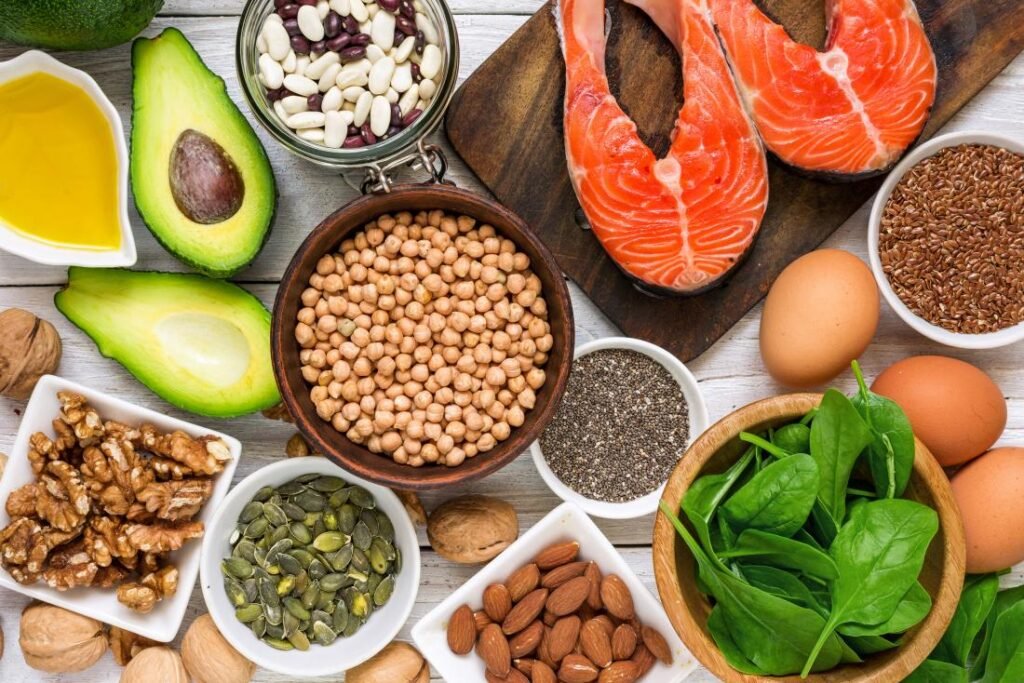Not all fat appears to be insufficient; we must distinguish between “good” and “bad” fats: unsaturated and saturated fats. We all need fat, so it doesn’t matter which kind we get.
People began eating more sugar, processed carbs, and prepared foods when fat was demonised. Finally, the entire planet has become fatter and more miserable.
High-fat, healthy foods are a great way to add taste, satisfaction, and nutrition to your meals and snacks. This macronutrient is fantastic for a variety of reasons. Food tastes fantastic because fat creates a silky texture and intensifies flavours.
Even on the most restrictive diet, “good” foods high in unsaturated fatty acids should not be overlooked. Here are eight items you may eat to help your body function at its optimum.
Salmon
This lean, protein-packed fish is high in beneficial omega-3 fatty acids, which help to prevent cancer, protect the heart, and improve cognitive function. Fatty fish are high in unsaturated and omega-3 fatty acids, both of which are important for heart and brain health. Every week, people consume two meals of fatty fish.
Cooked tuna steaks, tuna burgers, tuna salad on a sandwich or lettuce basis, or tuna pottery are just a few ways to include this rich fish on your meal.
Salmon consumption can assist men improve their physical performance and combat ED difficulties. Fildena 50 and Cenforce 200, in addition to salmon, are the finest ED treatments.
Olives
Seven olives provide your body with vital unsaturated fatty acids while only containing 28 calories.
Black olives provide 6.67 g of monounsaturated fat per 100 g and 13.3 g of fibre, making them a staple of Mediterranean nutrition.
According to a new study, a compound found in olives called Oleuropein may help to avoid diabetes. Oleuropein was revealed to help the body generate more insulin while also refining the amylin molecule, which helps diabetes develop.
Extra-virgin olive oil is high in monounsaturated fats, which are good for your heart. Vitamin E, vitamin K, and strong antioxidants are also included. In people who are at high risk of developing cardiovascular disease, extra-virgin olive oil has been linked to a modest risk of heart disease and death.
Sunflower seeds are a type of sunflower.
It’s also a great addition to salads and snacks on its own, as it’s high in not only beneficial fatty acids but also magnesium and protein.
Avocado
The avocado is distinct from the majority of other fruits. Avocados are high in fats, whereas most fruits are high in carbohydrates. Avocados are one of the best sources of potassium in the diet, with 40% more potassium than bananas, a common high potassium meal. Avocado can be used in salads or mayonnaise and butter can be substituted for light, beneficial saturated fats.
Avocados can be spattered with a pinch of salt and pepper, or split into little pieces and drizzled with salt, pepper, olive oil, and balsamic vinegar. Avocado goes well with eggs as well.
Butter
Despite its high calorie and fat content, butter is an exceedingly nutritious food to have in your diet. However, pay heed to the amount: a tablespoon will suffice for your sandwich!
Cheese
Cheese is a nutrient-dense food. Given that a complete cup of milk is utilised to make a single compact slice of Cheese, it makes sense.
It’s also high in protein, with 6.7 grammes of protein in a single thick slice of Cheese, the equal of a glass of milk.
Cheese, like other high-fat dairy products, contains powerful fatty acids that have been linked to a variety of health benefits, including a lower risk of type 2 diabetes.
Flaxseeds
Flaxseeds provide omega-3 fatty acids as well as a healthy dose of fibre. Each 2-tablespoon meal has almost 9 grammes of fat, almost all of which is unsaturated, and 5.6 grammes of fibre.
Combine flax seeds with your smoothies or low-carb “oatmeal” for an additional boost of omega-3s and fibre. Flax seeds have been found to help protect against breast cancer in research.
Flaxseed has roughly 8 grammes of fat per ounce and is a good source of omega-3 fatty acids. Flaxseed also contains a mystery fat-soluble fibre that is ideal for satiation, digestive fitness, blood sugar control, and regular bowel movements.
Eggs
Whole eggs’ yolks are high in fat and cholesterol. Feel free to incorporate it in your diet unless you have high blood pressure! According to studies, the yolk has the highest concentration of omega-3 fatty acids.
While previous studies suggested that eggs lower cholesterol, subsequent evidence contradicts this. According to a study, eating up to one egg per day may reduce the risk of cardiovascular disease. Eggs can help men with ED issues, but if you have other options, Cenforce 100 and Fildena 100 are a better option.
Vitamin D and choline, a B vitamin that supports the ability of the liver, brain, nerves, and muscles, are also found in the yolk. Other phytonutrients, such as lutein, are also found in the yolk.


